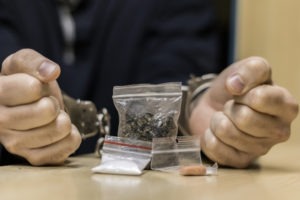

Call Attorney Marni Jo Snyder 24 Hours / 7 Days:
215.515.3360While working to maintain a strong client-attorney relationship, Philadelphia criminal attorney Marni Jo Snyder of the Law Offices of M.J. Snyder is committed to protecting and fighting for her clients’ rights, and securing a favorable outcome.
O ur Philadelphia criminal defense firm has a proven track record representing individuals charged with both violent and non-violent crimes, including assault, sexual assault, rape, homicide, gun crimes, and drug charges.
ur Philadelphia criminal defense firm has a proven track record representing individuals charged with both violent and non-violent crimes, including assault, sexual assault, rape, homicide, gun crimes, and drug charges.
Learn about each of our criminal defense practice areas, the potential penalties for specific charges, and examples of how our attorneys can help mitigate consequences below.
A violent crime involves the threat, attempt, or use of physical force against another person or their property. These criminal offenses are typically intended to cause fear, serious emotional trauma, bodily injury, or death. Violent crimes include assault, sex crimes, homicide, and gun crimes.
These offenses are classified as felonies and carry severe penalties including sentences of up to life imprisonment and expensive fines. In addition, violent crime convictions can be devastating to a person’s quality of life by impacting their reputation, employment opportunities, civil rights, and personal freedom.
Learn about each of the violent-crime practice areas that our Philadelphia criminal defense firm handles below.
For a free legal consultation with a lawyer serving Philadelphia, call 215.515.3360

Assault happens when someone intentionally, knowingly, or recklessly causes (or attempts to cause) bodily harm to another person, and can pertain to either a physical attack or threat.
There are two different types of assault charges: simple assault (a misdemeanor) and aggravated assault (a felony); the main difference lies in the severity of the injury, threat, or attempt — simple assault refers to minor offenses while aggravated assault refers to major offenses.
In terms of potential penalties, simple assault is punishable by up to two years in prison and a $5,000 fine while aggravated assault is punishable by up to 10 to 20 years in prison and a maximum $25,000 fine.
Our proven Philadelphia assault attorneys are available to help you or a loved one achieve a favorable outcome by, for example, arguing self-defense or the defense of others, claiming lack of intent, challenging the credibility of a witness, or describing how the alleged incident was a mutual fight.
Personal Injury Lawyer 215.515.3360

Homicide is the unlawful killing of another person. The two main categories of homicide are murder and manslaughter.
Murder is classified as either first-, second-, or third-degree. First-degree murder is typically premeditated and intentional while second-degree murder occurs while committing another felony such as rape, robbery, or burglary.
Third-degree murder encompasses all other murders not considered either first- or second-degree. Both first- and second-degree murder convictions carry a mandatory life imprisonment while third-degree murder can result in up to 40 years in prison.
In regards to manslaughter, there are two different types of charges: voluntary and involuntary; both of which typically consist of non-premeditated acts that cause another person’s death.
Voluntary manslaughter occurs when someone intentionally but impulsively kills another person in the “heat of the moment” while involuntary manslaughter is the result of reckless or negligent behavior. Convictions can result in imprisonment of up to 20 years for involuntary manslaughter and up to five years for voluntary.
Our leading Philadelphia homicide attorneys could help your loved one reach a dismissal, acquittal, or reduced sentence by, for example, challenging forensic evidence or witness testimony, negotiating a plea deal, or arguing self-defense, lack of intent, or mistaken identity.

The term “sex crimes” describes a wide range of unlawful sexual behavior — including both consensual and non-consensual — usually defined by statutes overseeing sexual consent, conduct, and age. This category consists of criminal offenses such as sexual assault, sexual abuse, and rape.
Defendants charged with sex crimes could be dealt harsh penalties if convicted. Along with mandatory sex offender registration, potential imprisonment includes up to 10 years for sexual assault, from up to 20 to 40 years or life for rape (depending on the victim’s age and bodily harm), up to seven years for indecent assault, and up to 20 years for aggravated assault.
Depending on the nature of the case, our Philadelphia criminal lawyers can help attain the best possible result by, for example, arguing that the sexual activity was consensual, claiming mistaken identity or false accusations, or challenging the accuracy of forensic evidence.

Gun charges are brought about when a person violates laws related to firearms such as illegal possession, carrying, or use. Different types of gun crimes include Prohibited Person, Carrying Without a License, Carrying a Firearm with Intent to Commit a Crime, and Crimes Committed with Firearms.
Regarding penalties for gun crimes, misdemeanors (less severe) are punishable by up to five years in jail and up to $10,000 in fines while felonies (more severe) are punishable by up to seven years in jail and up to $25,000 in fines. Enhancements may be applied to felonies where a shooting occurred during a crime, causing sentences to exceed 10-20 years’ imprisonment and $25,000 or more in fines.
Based on the details of a case, our reputable Philadelphia gun charge lawyers can help by, for example, filing a motion to suppress evidence found during an unlawful traffic stop or illegal search, negotiating a plea deal to reduce the charge, or advocating for leniency by emphasizing the defendant’s lack of prior criminal history.
A non-violent crime is an offense that does not involve the threat or use of physical force or bodily harm against another person. Instead, these crimes typically involve property damage, fraud, or regulatory violations.
The Law Offices of M.J. Snyder, LLC provides representation for individuals charged with non-violent crimes such as Driving Under the Influence (DUI), Drug Charges, and Probation Violation.
While the potential penalties for non-violent crimes are generally less severe than violent crimes since they do not involve physical harm and the defendant is considered less of a risk to public safety, they can still entail prison time, expensive fines, and other consequences that could hurt one’s quality of life.
Learn about each of the non-violent crime practice areas that our firm handles below.

A Driving Under the Influence (DUI) charge is brought forth when a person operates a motor vehicle while impaired by drugs or alcohol to an extent that deems them incapable of safe driving. Charges are based on a person’s blood alcohol content (BAC) level and consist of General Impairment, High BAC, and Highest BAC.
Potential penalties for first DUI offenses include:
Second and third DUI offenses involve imprisonment up to five years, fines up to $10,000, and 12-18 month license suspension.
Based on the specifics of your DUI case, our seasoned DUI lawyers in Philadelphia could help improve the outcome by, for example, pursuing diversion or ARD (Accelerated Rehabilitative Disposition) for first-time offenders (which leads to dismissal upon completion), challenging the traffic stop by claiming the officer lacked reasonable suspicion or probable cause, or highlighting the improper administration or unreliability of a field sobriety test.

A drug crime arises when a person engages in illegal activity involving controlled substances, such as possession, distribution, manufacturing, or trafficking. Common drug charges in Philadelphia include Simple Possession, Possession with Intent to Deliver (PWID), and Drug Delivery Resulting in Death (DDRD).
Based on factors including the type of drug, quantity, and prior record, drug crimes could be charged as either a felony or misdemeanor. Aside from potentially costly fines, imprisonment for drug crimes range from up to one to three years for Possession, up to five to 20 years for Possession with Intent to Deliver (PWID), and up to 40 years for Drug Delivery Resulting in Death (DDRD).
Depending on the circumstances, our Philadelphia drug lawyers can increase the chances of a dismissal, acquittal, or reduced sentence by, for example, challenging the legality of the search or seizure, disputing possession, negotiating a plea deal, or advocating for placement in drug court or treatment programs.

A probation violation takes place when a person on probation fails to follow the terms and conditions set by the court. An infringement is considered either technical (i.e., violating rules) or substantive (i.e., committing a new crime).
Other examples of probation violations include testing positive for drugs or alcohol, failing to attend a court hearing, missing a scheduled appointment with a probation officer, and not paying court-ordered fines or restitution.
Based on factors such as the severity of the violation, original offense, and the defendant’s criminal history, potential penalties include a warning or reprimand, stricter conditions, lengthened term, brief jail time, new criminal charges, loss of credit for time served, or removal from alternative programs.
Our seasoned Philadelphia defense attorneys can help you or a loved one lighten the consequences of a probation violation by, for example, seeking to dismiss the violation, maintain their existing terms, or secure a reduced sentence through a plea bargain.
If you or a loved one is charged with a non-violent crime, count on our skilled defense attorneys in Philadelphia to thoroughly review your case, explain your charges and options, and fight for the best-case scenario — whether that involves an acquittal, dismissal, or reduced sentence through a plea bargain.
Schedule your free consultation online or call 215-515- 3360 today to begin the process of gaining clarity and seeing your path forward.
If you or a loved one is facing federal criminal charges or state criminal charges, you can speak with experienced defense attorney Marni Jo Snyder one-on-one for free.
Request Free ConsultationCall 24/7: 215.515.3360
Email: info@snyderlawyer.com
Fax: 215-376-6981
This website is for general informational purposes only. The act of sending an e-mail to the Firm or any attorney at the Firm, or submitting a form response or other materials through the website, will not create an attorney-client relationship. The only way to create an attorney-client relationship with the Firm is through a written agreement.Read More